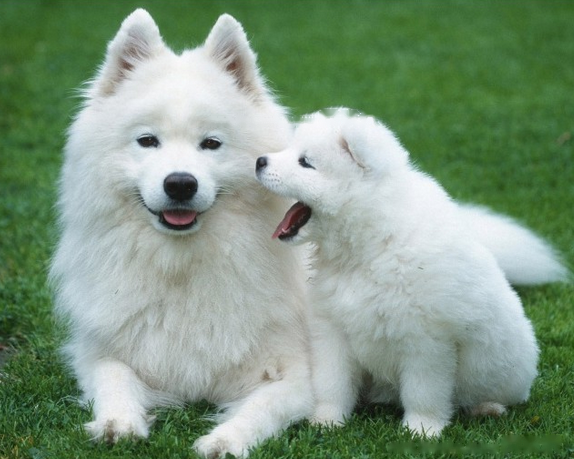Before you bring home a cute Samoyed, be sure to do your homework on feeding them.

The growing and developing Satsuma puppies have higher nutritional requirements than the average adult dog. Therefore, the food you feed your Satsuma puppies at this age must be a pet food that is specifically designed for the developmental period and provides complete, balanced nutrition. Also, there is no need to additionally feed extra vitamins, minerals, meat or any other supplements.
Because the stomach capacity of the Satsuma puppy is not large enough, it cannot get all the nutrients needed for a day at one time. Therefore, you must feed your young Samoyed puppy more than three meals a day until the increase in food requirements (per pound of body weight) slows as he gets older. When the puppy is four to five months old, the feeding frequency can be reduced to twice a day; when the puppy is over eight months old, feeding once a day is enough. Remind yourself to keep fresh water for your Satsuma puppies at all times.
As with a pregnant bitch, you can increase your Satsuma puppy's food intake by moistening dry food with lukewarm water. You can of course wet dry food with milk, but remember: too much milk can be counterproductive like a laxative and can cause digestive problems; this applies to both Samoyed puppies and adult dogs. You should give your Satsuma puppies an hour to eat at each feeding; after an hour, any food your Satsuma puppies have not eaten should be discarded. Soaked dry food or canned food may deteriorate in taste if placed at room temperature for a period of time; if left for several hours, it may even spoil.
Warm reminder
In order to let the Satsuma puppies develop good eating habits, we recommend that you: feed regularly and quantitatively; this can help the Satsuma puppies get used to home life. We do not recommend that you feed your Satsuma puppies with human food, as this will create not only the habit of begging for food, but also the habit of being picky eaters. If your Satsuma puppy's food already provides complete, balanced nutrition, then there is no need to feed extra vitamins, minerals or meat. In fact, studies have confirmed that excessive vitamin, mineral and other supplements are detrimental to the health of developing Samoyed puppies.
The amount of food each puppy should be fed may vary due to body size, activity level, metabolic rate and growth environment. Don't make your Samoyed puppy too heavy, not only will it make your Samoyed puppy look unhealthy, but it will also make your Samoyed puppy's bones deformed. If your Satsuma puppy seems to be overweight, the amount of feeding should be reduced. If your Samoyed puppy is underweight and doesn't have any unhealthy symptoms, you can increase the amount of food he feeds. Whenever you have any questions or concerns about your dog's physical condition, please seek the professional advice of your veterinarian directly.
![[Dog Training 5] The training method of pet dog dining etiquette](/static/img/12192/12192_1.jpg)




